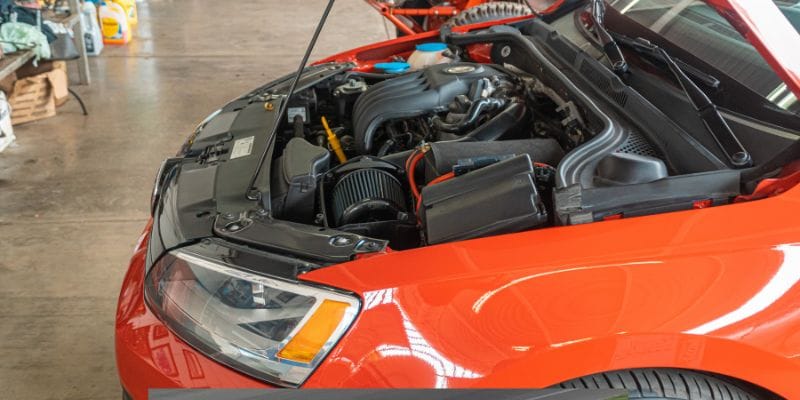How to Fix Powertrain Fault Ford Fusion: Expert Tips & Solutions
To fix Powertrain Fault Ford Fusion, first, check the Transmission Control Module (TCM) for any updates or reprogramming. Then, examine the wiring and connectors for any damage or corrosion.
This will help resolve the Powertrain Fault in Ford Fusion and ensure the smooth functioning of the vehicle. Ford Fusion is a popular sedan that offers a blend of style, comfort, and performance. However, some owners may encounter the Powertrain Fault issue, which can be concerning.
Understanding how to address this problem is essential for maintaining the vehicle’s reliability and performance. In this guide, we will provide a step-by-step solution to effectively fix the Powertrain Fault in your Ford Fusion, allowing you to restore the optimal operation of your car while ensuring safety and peace of mind on the road.
Common Symptoms Of Powertrain Fault
A powertrain fault can cause significant issues in your Ford Fusion. Recognizing the common symptoms can help you diagnose and address the problem promptly, ensuring the seamless performance of your vehicle. Here are the key signs to look out for:

Engine Misfire
One of the most prevalent symptoms of a powertrain fault is an engine misfire. You may notice jerking or hesitation while accelerating, rough idling, or a significant decrease in fuel efficiency. If you experience any of these symptoms, it’s crucial to have your vehicle inspected by a qualified mechanic.
Transmission Issues
Another indicator of a powertrain fault is transmission problems. You might experience delayed or rough shifting, strange noises during gear changes, or an unresponsive transmission. Addressing these issues promptly can prevent more severe damage to the transmission system.
Warning Lights
The illumination of dashboard warning lights, such as the Check Engine light or Transmission Warning light, can be a clear indication of a powertrain fault. Ignoring these warnings can exacerbate the issue and lead to costly repairs.
Diagnosing Powertrain Fault
Diagnosing a powertrain fault in your Ford Fusion involves using diagnostic tools to pinpoint the issue. Once identified, fixing the powertrain fault may require repairing or replacing components such as the transmission, engine, or other related systems to restore the vehicle’s performance.
Obd-ii Diagnostic Tool
Using an OBD-II diagnostic tool is the first step in diagnosing a powertrain fault in your Ford Fusion. This tool plugs into the OBD-II port under the dashboard and retrieves error codes from the vehicle’s computer. These codes provide valuable information about the specific issues affecting the powertrain.
Visual Inspection
Performing a visual inspection is crucial in diagnosing a powertrain fault. Inspect all components for visible damage or wear, including engine, transmission, and exhaust system. Look for leaks, cracks, or loose connections that may indicate a problem.
Test Drive
Conducting a thorough test drive is an important part of the diagnostic process. Take the Ford Fusion for a drive and pay attention to any unusual noises, vibrations, or lack of power. Observe the vehicle’s performance and note any abnormalities that may point to a powertrain issue.
Addressing Powertrain Fault In Ford Fusion
Dealing with a powertrain fault in your Ford Fusion can be a frustrating experience. However, understanding the common issues and implementing the right solutions can help you address the problem effectively. Below, we’ll go over some key steps to help you fix a powertrain fault in your Ford Fusion.
Check Engine System Components
When diagnosing a powertrain fault in your Ford Fusion, it’s important to start by checking the engine system components. This includes inspecting the throttle body, oxygen sensors, and other crucial parts for any signs of wear, damage, or malfunction. By identifying and addressing issues with these components, you can prevent potential powertrain faults and ensure the smooth operation of your vehicle.
Transmission Fluid Inspection
Another critical step in resolving powertrain faults in your Ford Fusion is to conduct a thorough inspection of the transmission fluid. Low or contaminated transmission fluid can lead to various transmission-related issues, potentially triggering powertrain fault codes. Regularly checking and maintaining the transmission fluid levels and quality is essential for preventing powertrain-related problems and ensuring optimal performance of your vehicle.
Powertrain Control Module (PCM) Re-flash
In some cases, addressing a powertrain fault in your Ford Fusion may require re-flashing the Powertrain Control Module (PCM). This process involves updating the software within the PCM to resolve any existing software glitches or inconsistencies. By performing a PCM re-flash, you can potentially rectify powertrain-related issues and improve the overall functionality of your Ford Fusion.
Preventive Maintenance For Powertrain Health
The powertrain system of your Ford Fusion is crucial for its performance and efficiency. By implementing preventive maintenance, you can ensure the health and longevity of the powertrain, preventing any potential issues from arising. Here are some essential preventive measures to maintain the powertrain health of your Ford Fusion.
Regular Fluid Checks
Regularly checking the fluid levels in your Ford Fusion is vital for the proper functioning of the powertrain. Engine oil, transmission fluid, and coolant are essential fluids that need to be inspected at regular intervals to ensure they are at the appropriate levels and free from any contamination. Maintaining proper fluid levels helps in preventing premature wear and tear of the powertrain components.
Engine And Transmission Servicing
Routine servicing of the engine and transmission is critical for keeping the powertrain in top condition. This includes regular oil changes, filter replacements, and inspection of belts and hoses. Additionally, ensure that the transmission is serviced according to the manufacturer’s recommendations. Sticking to a regular servicing schedule can prevent potential powertrain faults and maintain optimal performance.
Computer System Updates
Keeping the electric control module (ECM) and transmission control module (TCM) updated with the latest software is essential for the overall health of the powertrain. Software updates provided by Ford can address performance issues and potential faults. These updates can enhance the efficiency and reliability of the powertrain, ultimately contributing to the overall longevity of your Ford Fusion.

Expert Tips And Solutions For Powertrain Fault
Welcome to our comprehensive guide on resolving powertrain faults in the Ford Fusion. Whether you’re a seasoned enthusiast or a first-time car owner, dealing with powertrain faults can be a daunting task. In this article, we’ll explore expert tips and solutions to effectively address powertrain issues, keeping your Ford Fusion running smoothly on the road.
Troubleshooting Specific Issues
When faced with a powertrain fault in your Ford Fusion, it’s crucial to address specific issues systematically. Here are some expert tips for troubleshooting common powertrain problems:
- Check for error codes using a diagnostic scanner to pinpoint the exact issue.
- Inspect the transmission fluid level and quality to ensure proper lubrication and transmission performance.
- Examine the condition of the spark plugs and ignition system to identify any potential misfires or electrical faults.
- Perform a thorough visual inspection of the engine components, looking for signs of wear, leaks, or damage.
Seeking Professional Assistance
If you encounter complex powertrain issues beyond your expertise, it’s advisable to seek professional assistance. Consider these steps when enlisting the help of a qualified technician:
- Research and select a reputable automotive service center with experience in diagnosing and repairing powertrain faults.
- Discuss the specific symptoms and diagnostic findings with the technician to ensure a targeted approach to resolving the powertrain fault.
- Request a detailed breakdown of the proposed repairs and associated costs before authorizing any work on your Ford Fusion.
Implementing Manufacturer Recommendations
To effectively address powertrain faults in your Ford Fusion, it’s essential to adhere to the manufacturer’s recommendations. Here’s how you can implement these guidelines:
- Refer to the owner’s manual for maintenance schedules and recommended service intervals to prevent potential powertrain issues.
- Utilize genuine OEM parts and fluids when performing repairs and maintenance to ensure optimal performance and longevity of your Ford Fusion.
- Stay informed about any recalls or technical service bulletins related to powertrain components issued by Ford to address potential design or manufacturing defects.
Frequently Asked Questions Of How To Fix Powertrain Fault Ford Fusion
What Is A Powertrain Fault In A Ford Fusion?
A powertrain fault in a Ford Fusion typically refers to a problem within the vehicle’s engine, transmission, or other key components. It could trigger the vehicle’s diagnostic system and should be addressed promptly by a qualified mechanic to prevent further damage.
How Do I Diagnose A Powertrain Fault In My Ford Fusion?
Diagnosing a powertrain fault in your Ford Fusion involves using a diagnostic scanner to retrieve trouble codes and pinpoint the specific issue. Once the fault is identified, it’s essential to consult a professional mechanic for a thorough inspection and repair.
Can I Fix A Powertrain Fault In My Ford Fusion Myself?
While some basic maintenance tasks can be performed by car owners, fixing a powertrain fault in a Ford Fusion often requires specialized knowledge and tools. It’s advisable to seek the expertise of a certified mechanic to properly diagnose and resolve the issue to ensure long-term reliability.
What Are The Common Causes Of Powertrain Faults In Ford Fusion?
Common causes of powertrain faults in Ford Fusion could include issues with the engine, transmission, sensors, or electrical components. Fluid leaks, worn-out parts, and electronic malfunctions may also contribute to powertrain problems that require professional attention to resolve effectively.
Conclusion
In light of the common powertrain fault in Ford Fusion, it is important to utilize the diagnostics and troubleshooting tips provided in this guide to effectively resolve the issue. By following the outlined steps and seeking the help of a professional if necessary, you can ensure the proper functioning and longevity of your vehicle.







